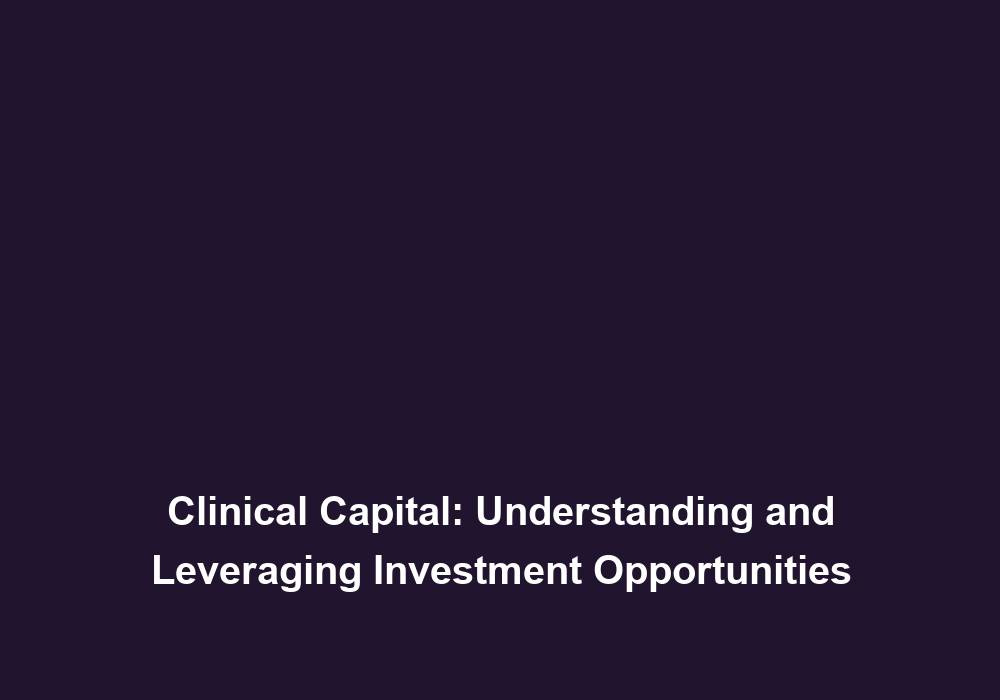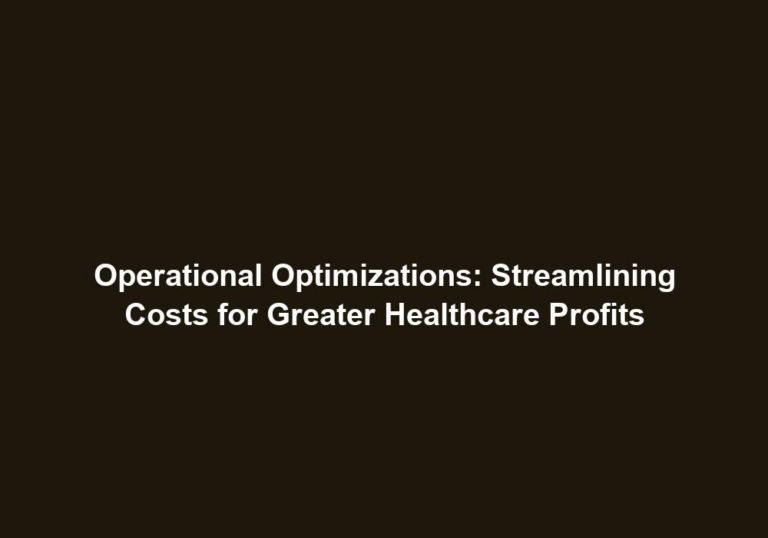Clinical Capital: Understanding and Leveraging Investment Opportunities
Investing in the healthcare industry can be highly lucrative, especially considering the constant advancements and innovations in clinical research, technology, and patient care. One key aspect of healthcare investments is clinical capital, which refers to the financial resources utilized in the development and growth of medical institutions, pharmaceutical companies, and healthcare startups. This article aims to provide a comprehensive understanding of clinical capital and shed light on the various investment opportunities within the healthcare sector.
What is Clinical Capital?
Clinical capital encompasses the funds, both monetary and non-monetary, required to support clinical research, medical trials, drug development, and the overall expansion of healthcare facilities. It plays a crucial role in fueling innovation, improving patient outcomes, and fostering the growth of the healthcare industry as a whole. Clinical capital can be categorized into different types, including:
-
Financial Capital: Financial capital is an essential component of clinical capital and refers to the monetary resources invested in healthcare organizations, such as hospitals, clinics, and pharmaceutical companies. These funds support various aspects of the healthcare industry, including research and development, infrastructure, equipment, human resources, and other operational expenses. By investing in financial capital, investors have the opportunity to contribute to the growth and success of medical institutions and pharmaceutical companies while potentially generating significant financial returns.
-
Intellectual Capital: Intellectual capital plays a vital role in the advancement of healthcare and refers to the knowledge, expertise, and intellectual property that contribute to innovations in medical technology, pharmaceutical formulations, and clinical procedures. This includes patents, trademarks, copyrights, and trade secrets. By investing in intellectual capital, investors can support the development of groundbreaking medical advancements and contribute to the growth of healthcare companies through research and innovation.
-
Social Capital: Social capital is an often overlooked but crucial form of clinical capital. It refers to the relationships and networks established within the healthcare ecosystem, involving collaborations between healthcare professionals, researchers, investors, and industry stakeholders. These collaborations promote knowledge exchange, partnership opportunities, and access to resources, ultimately fostering innovation and growth within the healthcare industry. Investors can leverage social capital by establishing strategic partnerships and collaborations, which can lead to significant investment opportunities and a deeper understanding of the healthcare landscape.
Understanding the different forms of clinical capital is essential for investors looking to make informed decisions and identify promising investment opportunities within the healthcare industry.
Investment Opportunities in Clinical Capital
The healthcare sector offers a wide range of investment opportunities for individuals and organizations interested in clinical capital. Here are some areas where investors can leverage their resources and contribute to the growth and success of the healthcare industry:
1. Pharmaceutical and Biotechnology Companies
Investing in pharmaceutical and biotechnology companies presents a significant opportunity for clinical capital investment. These companies are at the forefront of drug discovery, development, and commercialization. By investing in promising research projects or established companies, investors can support the development of life-saving medications and therapies while potentially reaping substantial financial returns. Additionally, investors can actively contribute to the advancement of medical science and improve patient outcomes.
Some key investment opportunities within pharmaceutical and biotechnology companies include:
- Investing in early-stage drug development companies that focus on promising therapies for unmet medical needs.
- Supporting established companies that have a strong pipeline of innovative drugs and therapies.
- Investing in research institutions that collaborate with pharmaceutical and biotechnology companies to drive advancements in medical science.
2. Medical Device and Equipment Manufacturers
The medical device and equipment industry is another attractive area for clinical capital investment. With advancements in technology, there is a constant demand for innovative medical devices, ranging from state-of-the-art imaging equipment to precision surgical instruments. Investing in this sector allows investors to support the development and commercialization of cutting-edge medical technologies while catering to the evolving needs of healthcare providers and patients.
Investment opportunities within the medical device and equipment industry include:
- Investing in companies that specialize in the development of advanced medical imaging technologies, such as MRI machines and CT scanners.
- Supporting manufacturers of surgical instruments that improve the precision and safety of surgical procedures.
- Investing in companies that develop innovative healthcare devices, such as wearable technology for monitoring patient health.
3. Healthcare Real Estate
Investments in healthcare real estate, including hospitals, clinics, and medical office buildings, offer stable and long-term returns. With the increasing demand for healthcare services and the need for updated infrastructure, investing in healthcare real estate provides an opportunity to leverage clinical capital while contributing to the improvement of healthcare facilities and accessibility.
Investment opportunities in healthcare real estate include:
- Investing in the development of new healthcare facilities in areas with growing populations and limited access to quality healthcare.
- Acquiring existing healthcare properties and upgrading them to meet modern healthcare standards.
- Supporting the construction of specialized healthcare facilities, such as rehabilitation centers or long-term care facilities.
4. Clinical Research and Trials
Clinical research and trials are vital for the advancement of medical knowledge and the development of new treatments. Investing in clinical trials allows investors to support research initiatives, potentially leading to groundbreaking discoveries and medical breakthroughs. By identifying promising drug candidates or supporting research institutions, investors can play an active role in shaping the future of healthcare.
Investment opportunities in clinical research and trials include:
- Supporting clinical trials for promising drug candidates that have the potential to address unmet medical needs.
- Investing in research institutions that focus on specific therapeutic areas, such as oncology or neurology.
- Supporting initiatives that aim to improve the efficiency and effectiveness of clinical trials through the use of technology and data analytics.
5. Digital Health Startups
With the rapid integration of technology in healthcare, investing in digital health startups offers substantial opportunities for clinical capital investment. These startups focus on leveraging technology to improve patient care, enhance healthcare delivery systems, and streamline administrative processes. Investing in digital health startups allows investors to support disruptive innovations while potentially benefiting from their growth and success.
Investment opportunities in digital health startups include:
- Investing in startups that develop innovative healthcare apps and platforms to improve patient engagement and care coordination.
- Supporting companies that leverage artificial intelligence and machine learning to enhance diagnostic accuracy and treatment planning.
- Investing in telemedicine startups that provide remote healthcare services and expand access to quality care.
Conclusion
Clinical capital plays a crucial role in fueling the growth and innovation within the healthcare industry. By understanding the various forms of clinical capital and identifying investment opportunities, investors can make informed decisions and contribute to the advancement of medical research, patient care, and the overall improvement of healthcare services. Whether through investments in pharmaceutical companies, medical devices, healthcare real estate, clinical research, or digital health startups, clinical capital offers a pathway for investors to support the healthcare industry while potentially reaping substantial financial rewards.







